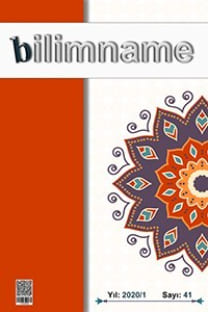Aristoteles'in Eylem Teorisinde Doğa, Toplum, Tanrı
Aristoteles tevarüs ettiği teorik birikimi bilimsel bir duyarlılıklaişlevselleştirmek suretiyle özgün bir felsefe kavrayışı geliştiren ve özelde Batıdüşünce geleneğine belirli bir rota çizen kurucu bir figürdür. Bu doğrultudaMetafizik’te felsefe tarihçisi kimliğiyle, tevarüs ettiği birikimi, geliştirdiğibilimsel açıklamanın materyali olarak değerlendirmiştir. Böylece bu birikimiçinde muhtelif türevleriyle karşımıza çıkan üç ilkeyi, açıklayıcı bir çerçeveolarak hiyerarşik bir birlik içinde formüle etmiştir. Bu müdahale, Aristotelesöncesi birikimin otantik bağlamı içerisinde anlaşılmasını zorlaştırmakla birlikte,geliştirmiş olduğu “bilimler sistemi olarak felsefe” kavrayışının inşası içinişlevsel olmuştur. Temeli mantık, tematik yapısı ise bilimlerin sınıflandırmasıaracılığıyla kurulan bu sistemin açıklayıcı ilkeleri ise hiyerarşik bir birlik içindebulunan indirgenemez üçlülerdir. Bu üçlüler literatürde genellikle retorik vepolitika ile ilgili tartışmalarda “pathos, ethos, logos” olarak dikkate alınmıştır.Oysa farklı türevleri bulunan bu üçlü, terim veya fikir olarak Aristoteles’in eylemteorisini teorik ve pratik bağlamları açısından karakterize etmektedir. Gerçektende eylem sorunu ilk bakışta genelde pratik felsefe, özelde ahlak felsefesiyle sınırlıdüşünülmesine rağmen Aristoteles’te teorik bağlamlara sahiptir. Aristoteles’ineylem teorisini dikkate alacağımız bu çalışmada üçlü açıklayıcı ilkeleri “doğal,toplumsal, Tanrısal” şeklinde kullanacağız. Bu çalışmanın amacı, Aristoteles’ineylem teorisinin genel bir betimlemesi yoluyla, genelde pratik felsefesine, özeldeeylem teorisine ilişkin indirgemeci yorumlara karşı, “açıklayıcı ilkeler olarakçeşitli türevleri bulunan indirgenemez üçlünün hiyerarşik bir birlik içindeAristoteles felsefesini karakterize ettiği”ni göstermeye çalışmaktır. Bunun içinAristoteles’in eylem teorisini “eylemin doğası”, “yönelimsel güçler” ve “eylemmotifleri” başlıklarıyla ele alacağız. Göstermeye çalışacağız ki Aristoteles tevarüsettiği birikimden farklı olarak felsefeyi bilimler sistemi olarak yeniden kurmagirişiminde doğal, toplumsal ve Tanrısal olan arasında indirgemeci bir seçimyapmaksızın hiyerarşik bir birlik kurmaktadır.
The Nature, The Customary, and The Divine in the Aristotle's Action Theory
Aristotle is a founding figure who alters the comprehension of philosophy by inheriting the theoretical accumulation of knowledge he gained with scientific sensitivity and by particularly forging a new path to the tradition of Western thought. In line with this role and as a historian of philosophy in Metaphysics, he assessed the accumulation of knowledge he inherited as the material for the scientific explanation he developed. This assessment caused comprehension of the previous theoretical accumulation of knowledge in its authentic context to be difficult; however, it was functional in terms of the construction of Aristotle's project of "philosophy as system of sciences", which was first articulated by him. The explanatory principles of this system, whose basis is established through logic and whose thematic structure is established through the classification of sciences, are the irreducible trio which have a hierarchical unity. This three principle is commonly regarded as pathos, ethos, and logos in rhetoric and politics. However, this trio, which has a few derivatives, characterizes his project by term or idea. In this study, where we explore Aristotle's theory of action, we will employ the relevant trio as "the natural, the customary, and the divine". At first glance, the problem of action is thought to be limited to practical philosophy in general and moral philosophy in particular but for Aristotle, this problem expands to all philosophical disciplines. So the aim of this study is to contribute to the claim that hierarchical unity of irreducible trio characterizes Aristotle's philosophy by a general portrayal of Aristotle's theory of action. Therefore, we will approach Aristotle's theory of action thematically through the issues of "nature of action," "powers of soul," and "action patterns." We will attempt to demonstrate that contrary to the accumulation that Aristotle inherited, he does not make a reductionist selection between the natural, the customary, and the divine in his attempt to re-establish philosophy as a system of sciences; rather, he establishes a hierarchy...
___
- ARISTOTELES. Eudemos’a Etik. Çev. Saffet Babür. Ankara: BilgeSu Yayıncılık, 2011.
- ARISTOTELES. Fizik. Çev. Saffet Babür. İstanbul: Yapı Kredi Yayınları, 2003.
- ARISTOTELES. Metafizik. Çev. Ahmet Arslan. İstanbul: Sosyal Yayınları, 2010.
- ARISTOTELES. Nikomakhos’a Etik. Çev. Saffet Babür. Ankara: BilgeSu Yayıncılık, 2015.
- ARISTOTELES. Retorik. Çev. Mehmet H. Doğan. İstanbul: Yapı Kredi Yayınları, 2006.
- ARISTOTELES. Ruh Üzerine. Çev. Zeki Özcan. Ankara: Sentez Yayıncılık, 2014.
- BRAET, Antoine C. “Ethos, Pathos and Logos in Aristotle’s Rhetoric: A ReExamination”. Argumentation 6, sy 3 (1992): 307-20. https://doi.org/10.1007/BF00154696.
- CHARLES, David. Aristotle’s Philosophy of Action. London: Gerald Duckworth & Co Ltd, 1984.
- HELLER, Agnes. Bir Ahlak Kuramı. Çev. Abdullah Yılmaz, Koray Tütüncü ve Ertürk Demirel. Ankara: Ayrıntı Yayınları, 2015.
- LATACZ, Joachim. Antik Yunan Tragedyaları. Çeviren Y. Onay. İstanbul: Mitos Boyut Yayınları, 2006.
- MACINTYRE, Alasdair. Erdem Peşinde. Çeviren Muttalip Özcan. İstanbul: Ayrıntı Yayınları, 2011.
- MACINTYRE, Alasdair. Ethik’in Kısa Tarihi. Çeviren Hakkı Hünler ve Solmaz Zelyüt Hünler. İstanbul: Paradigma Yayıncılık, 2011.
- METE, Tunçay. Aristoteles, çev. Politika. İstanbul: Remzi Kitabevi, 2016.
- MURPHY, James Bernard. “Nature, Custom, and Reason as the Explanatory and Practical Principles of Aristotelian Political Science”. The Review of Politics 64, sy 3 (2002): 469-96. https://doi.org/10.1017/S0034670500034987.
- MÜLLER, Jozef. “Agency and Responsibility in Aristotle’s Eudemian Ethics”. Phronesis: A Journal for Ancient Philosophy 60, sy 2 (2015): 206-51.
- OMAY, N. Murad. Aristoteles’te İnsanın Nihai Amacı. Doktora Tezi, İstanbul: İstanbul Üniversitesi, 2010.
- ÖZTURAN, Hümeyra. Akıl ve Ahlak: Aristoteles ve Farabi’de Ahlakın Kaynağı Problemi. İstanbul: Klasik Yayınları, 2017.
- PIEPER, Annemarie. Etiğe Giriş. Çeviren Veysel Atayman ve Gönül Sezer. İstanbul: Ayrıntı Yayınları, 2012.
- ROSS, David. Aristoteles. Çeviren Ahmet Arslan. İstanbul: Kabalcı Yayınları, 2011.
- SCHLOSSER, Marcus. “Agency”. İçinde Standford Encyclopedia of Philosophy, 2015. https://plato.stanford.edu/entries/agency/.
- TAYLOR, Charles. Seküler Çağ. Çeviren Dost Körpe. İstanbul: Türkiye İş Bankası Yayınları, 2014.
- WEBER, Alfred. Felsefe Tarihi. Çeviren H. Vehbi Eralp. İstanbul: Sosyal Yayınları, 1998.
- WESTBERG, Daniel. Right Practical Reason. Oxford: Clarendon Press, 2002.
- ISSN: 1304-1878
- Yayın Aralığı: 2
- Başlangıç: 2003
- Yayıncı: -
